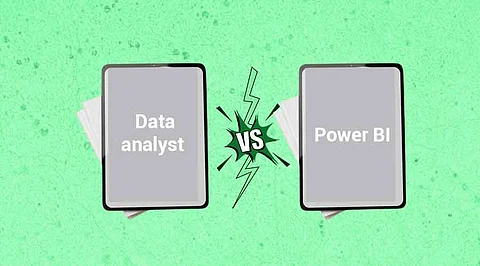

In the present business environment, data analysis is one of the most in-demand skills since data science companies use it to make strategic decisions and obtain a competitive advantage. Professionals who gather, purify, and analyze data sets to provide answers or find solutions are known as data analysts. To complete their jobs, they employ a variety of tools and approaches, including databases, spreadsheets, programming languages, and statistical techniques.
Data analysts frequently utilize Power BI to build and distribute interactive reports and dashboards. A cloud-based solution called Power BI may link to several data sources, including Salesforce, SQL Server, Excel, and more. With the use of drag-and-drop functionality, natural language queries, and artificial intelligence, Power BI users can transform, model, and visualize data. Users can collaborate and share their results on the web and mobile devices with Power business intelligence.
If you want to work in data analysis, you may be wondering how to decide between becoming a Power BI professional and a data analyst. Data Analyst Vs Power BI will be compared and contrasted in this article.
Strong analytical and problem-solving abilities are essential for both data analysts and Power BI specialists as they work with data to uncover patterns and solutions. In addition, they must be proficient in both presentation and communication since they will be explaining their conclusions and suggestions to a range of stakeholders. However, the particular technical capabilities required of data analysts and Power BI specialists are different. A strong basis in programming, statistics, and mathematics is required of data analysts. They must be knowledgeable in the use of programs like Tableau, R, Python, SQL, and Excel. Additionally, they must possess a thorough understanding of the many forms, sources, and kinds of data, including relational, non-relational, structured, and unstructured data.
On the other hand, experts in Power BI must possess a thorough understanding of Power BI and all of its features. They must be able to connect to various data sources, model and transform data, produce and modify visuals, use Power Query and Power Automate, develop DAX calculations, share, and secure reports. Additionally, they must be familiar with the fundamentals of data analysis ideas including modeling, data visualization, and data cleansing.
Data analysts are in charge of every step of the data analysis process, including gathering and interpreting the data. The tasks they have include determining the necessary data, gathering it from multiple sources, cleaning and preparing it for analysis, doing so using a variety of techniques and instruments, interpreting the results, and sharing the conclusions and suggestions. Market research, consumer segmentation, product optimization, fraud detection, and other issues are among the many tasks and issues that data analysts work on.
The creation and distribution of reports and dashboards using Power BI is the responsibility of Power BI specialists. They need to establish connections with the data sources, model and convert the data, produce and personalize the visualizations, write algorithms and queries, and publish and secure the reports. Experts in Power BI work on particular projects and issue categories, including business intelligence, data analytics, and data visualization.
Strong arithmetic, statistical, and programming abilities as well as a thorough awareness of various data forms and kinds are prerequisites for becoming a data analyst. It is imperative to have expertise with programs such as Excel, SQL, Python, R, and Tableau. Working on a variety of projects in a range of industries, your work entails the entire data analysis process, from collection to interpretation. Advancement into roles like data scientist, data engineer, data architect, or data manager is possible with this role's open career path.
A thorough understanding of Power BI, its tools, and fundamental data analysis ideas like data cleansing, modeling, and visualization are a must for anyone aspiring to become a Power BI specialist. Proficiency in connecting to data sources, modeling and manipulating data, DAX formula authoring, Power Query and Power Automate usage, and delivering secure reports are all necessary. As part of your job, you will be working on business intelligence, data analytics, and visualization projects as well as developing and publishing Power BI reports and dashboards. Opportunities for growth as a Power BI consultant, developer, architect, or manager are available with this specialized professional path.
Join our WhatsApp Channel to get the latest news, exclusives and videos on WhatsApp
_____________
Disclaimer: Analytics Insight does not provide financial advice or guidance. Also note that the cryptocurrencies mentioned/listed on the website could potentially be scams, i.e. designed to induce you to invest financial resources that may be lost forever and not be recoverable once investments are made. You are responsible for conducting your own research (DYOR) before making any investments. Read more here.
